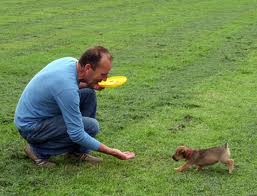
Teaching your puppy to come when called
 One of the most frustrating and embarrassing aspects of owning a dog is when he refuses to come when called. Anybody who has watched a program such as Dog Borstal will no doubt have been amused at an owner’s frustration when their pet completely ignores them, as it seems to be the epitome of an unruly pet. However, with the correct puppy training, you can be spared your blushes when you let your dog off his leash at your local park.
One of the most frustrating and embarrassing aspects of owning a dog is when he refuses to come when called. Anybody who has watched a program such as Dog Borstal will no doubt have been amused at an owner’s frustration when their pet completely ignores them, as it seems to be the epitome of an unruly pet. However, with the correct puppy training, you can be spared your blushes when you let your dog off his leash at your local park.
It’s vital that you teach your puppy to return to you when you call him. Lots of very young dogs display a tendency to fall into a false sense of security and follow people around. Also, at some point you are bound to take him for a walk where there are lots of distractions and interesting smells to explore. In both cases, you need to be confident that he will return when commanded to. Many owners are afraid that their pets will not return if they are allowed to run about freely. A dog that is constantly on a leash can become very frustrated at not being able to behave as a dog should, and this can lead to behavioural problems.
One step to making sure your puppy returns when called is to make sure that you are the most interesting thing around him. This is easy to do at home, but may be more difficult where there are more distractions, such as the park. In these cases, it’s important to have treats and toys to hand to entice him further. Don’t be afraid to come down to his level, either – a puppy’s line of focus is low to the ground, so be prepared to get down on one knee and shake his favourite toy or tap the ground.
As ever, it’s important to gain your pet’s attention before giving him a command. When he obeys, lavish him with praise and maybe a treat. It’s also wise to do this even when you haven’t called him to you. Should he become distracted, back away from him whilst making lots of exciting noises until you have his attention once again. Whatever you do, don’t chase after him – he will see this as a game, and will run further from you.
Whilst your puppy is young he will probably stay close to you for reassurance, so it’s best to take advantage of this by rewarding him when he comes to you of his own free will. It’s also a good idea to send him away to play again after he’s returned to you – puppy training is not a lot of fun for him to be put back on his leash every time he comes back to you.